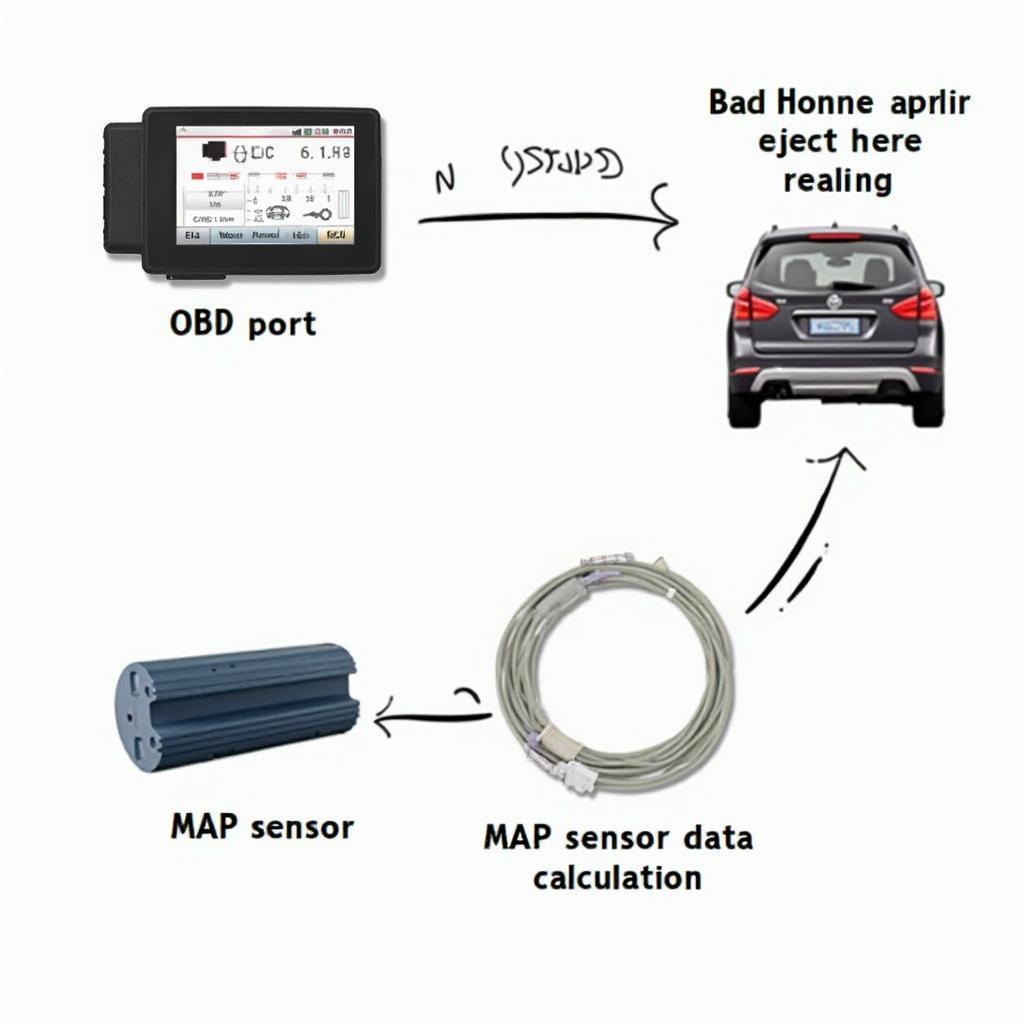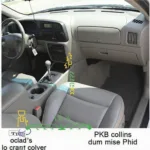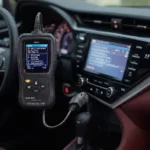Is OBD2 boost accurate? It’s a question that swirls in the minds of many car enthusiasts, especially those seeking to monitor and modify their vehicle’s performance. While OBD2 scanners offer a convenient way to access boost pressure data, understanding their accuracy is crucial for making informed decisions about tuning and modifications. This article dives deep into the intricacies of OBD2 boost readings, exploring their limitations, potential sources of error, and offering valuable insights into maximizing their accuracy.
Decoding OBD2 Boost Readings: How Does it Work?
OBD2 scanners don’t directly measure boost pressure. Instead, they rely on the Manifold Absolute Pressure (MAP) sensor, which measures the absolute pressure within the intake manifold. The engine control unit (ECU) then uses this MAP data, along with other parameters, to calculate boost pressure. This indirect measurement method is the root of potential inaccuracies.
Factors Influencing OBD2 Boost Accuracy
Several factors can affect the accuracy of OBD2 boost readings. One key factor is the quality of the MAP sensor itself. Low-quality sensors can be prone to drift and inaccuracies, affecting the calculated boost pressure. Additionally, leaks in the intake system can introduce errors. A leak allows unmetered air to enter the engine, reducing the pressure differential measured by the MAP sensor and impacting the boost reading. Finally, the ECU’s calibration plays a crucial role. Inaccuracies in the ECU’s algorithms can lead to deviations in the reported boost pressure.
Maximizing OBD2 Boost Reading Accuracy
While OBD2 readings might not be as precise as dedicated boost gauges, there are ways to improve their accuracy. Regularly checking for leaks in the intake system is essential. Even small leaks can significantly impact boost readings. Using high-quality OBD2 scanners known for their reliable data acquisition capabilities can also make a difference. obd2 port gauges are a good option for those who want more direct readings. Finally, understanding the limitations of OBD2 readings and comparing them with other data points can offer a more comprehensive picture of your vehicle’s performance.
Why Isn’t My OBD2 Boost Reading Matching My Gauge?
Discrepancies between OBD2 boost readings and dedicated boost gauges are common. Boost gauges are typically mechanical or electronic devices that directly measure boost pressure. This direct measurement method provides higher accuracy compared to the indirect method used by OBD2 scanners. Furthermore, the location of the boost gauge sensor and the OBD2’s MAP sensor can influence the readings. Differences in sensor response times can also contribute to variations. Therefore, slight discrepancies between the two are expected. If you’re looking for ways to tune your car, you might consider learning how to tune a car with obd2.
When Accuracy Matters Most: Tuning and Diagnostics
For basic monitoring and understanding boost trends, OBD2 readings can be sufficient. However, when it comes to precise tuning and critical diagnostics, dedicated boost gauges offer a higher level of accuracy. Tuning requires meticulous adjustments, and relying solely on OBD2 boost readings might not yield optimal results. You might want to consider obd2 aftermarket gauges for more accurate readings.
“In professional tuning environments, we rely on highly accurate, dedicated equipment,” says automotive engineer, Dr. James Thompson. “While OBD2 can provide useful data for general monitoring, precise tuning requires a higher level of precision.”
“Using OBD2 for tracking boost trends is like using a compass for navigation – useful for general direction but not for pinpoint accuracy,” adds Thompson.
Conclusion: Is OBD2 Boost Accurate Enough?
So, is OBD2 boost accurate? The answer depends on your needs. For general monitoring and understanding boost trends, OBD2 scanners offer a convenient and readily available solution. However, for precise tuning and critical diagnostics, the limitations of OBD2 boost readings become apparent. Dedicated boost gauges offer the accuracy required for these tasks. Understanding these nuances empowers you to effectively utilize OBD2 data and make informed decisions about your vehicle’s performance. If you’re using multiple devices, you might find this article on obd2 複数接続 helpful. You can also check obd2 read turbo boost for more information.
FAQ
- What is boost pressure?
- How does an OBD2 scanner measure boost?
- Why is my OBD2 boost reading different from my gauge?
- Can I use OBD2 for tuning?
- What is a MAP sensor?
- How can I improve the accuracy of my OBD2 boost readings?
- When should I use a dedicated boost gauge?
Need help with your car diagnostics? Contact us via WhatsApp: +1(641)206-8880, Email: [email protected] or visit us at 789 Elm Street, San Francisco, CA 94102, USA. We have a 24/7 customer support team.


